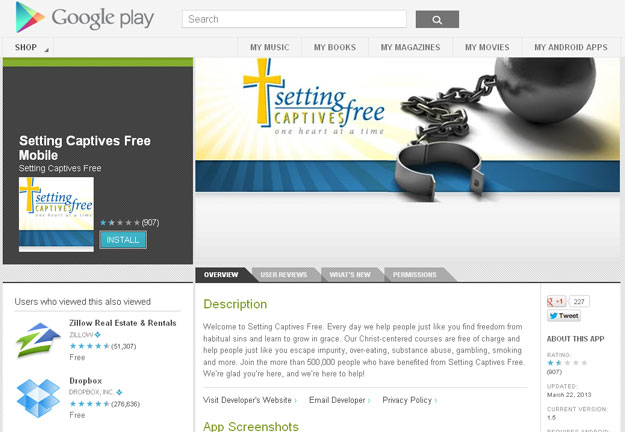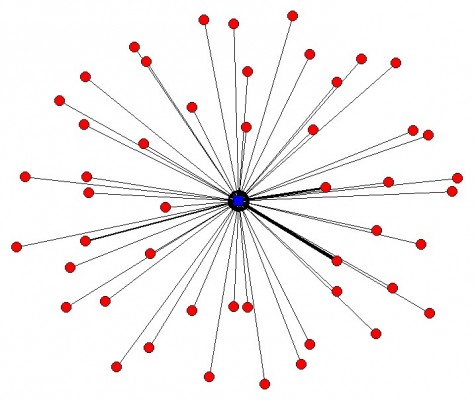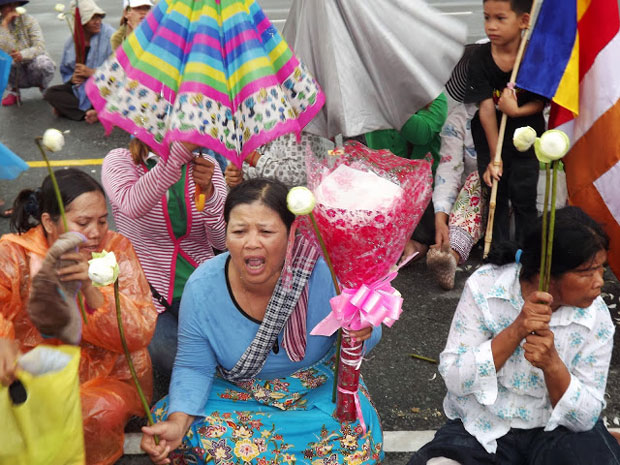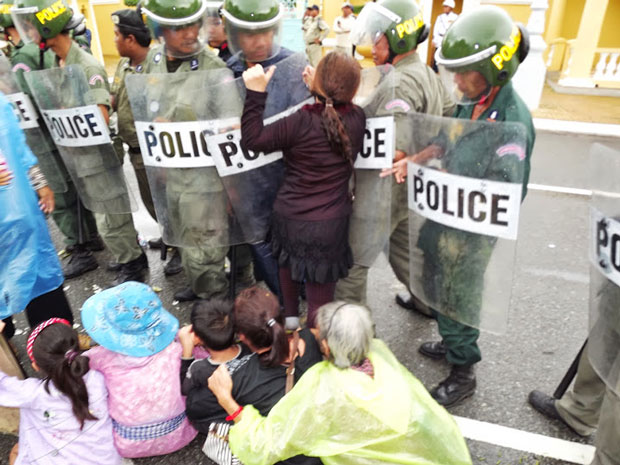
Just what is family-friendly Wi-Fi?
 Web filtering is not as simple as it sounds, says Brian Pellot
Web filtering is not as simple as it sounds, says Brian Pellot
(more…)
 Web filtering is not as simple as it sounds, says Brian Pellot
Web filtering is not as simple as it sounds, says Brian Pellot
(more…)

Gay rights campaigners should be wary of calling for censorship of a “sexual purity” app, says Sean Gallagher
All Out, a gay rights organisation, is behind an online petition calling on Google to remove an app called Setting Captives Free from its Play store. The group claims that Apple removed the app from iTunes after “just 24 hours”.
The app springs from a “non-denominational ministry which teaches the biblical principles of freedom in Jesus Christ” founded by Mike Cleveland. It connects users with the ministry’s free 60-day courses aimed at ridding them of their “habitual sins” like over-eating, substance abuse, gambling, smoking and impurity. One of the courses explores “sexual purity”.
All Out’s position is that these so-called “gay cures” “cause terrible harm to lesbian, gay, bi, and trans people, or anyone forced to try to change who they are or who they love”. The organisation should be applauded for its fight against bigotry and intolerance.
But their misguided petition — which has drawn 154,299 supporters as of this writing — crosses a very clear line into censorship.
Arguments for the public good were previously used to silence gay and lesbian people. We should be wary of even well intentioned censorship. If we apply All Out’s stand to all apps, we’d need to get Google to drop Manhunt, Grindr or other hookup apps that have the potential to harm gay men by spreading disease — a link made by New York authorities during a recent outbreak of meningitis.
There are over 700K apps on Google Play as of October 2012. Downloading is a choice.
Sean Gallagher is Editor, Online and News at Index on Censorship. He tweets from @seangallagherla
By Seth Masket / Pacific Standard
David Simon, the creator of HBO’s epic series The Wire, has weighed in on the recent disclosure that the National Security Agency has been combing through our cell phone records as part of its anti-terrorism efforts. It’s an interesting read, particularly coming from the guy who wrote such interesting stories (presumably based on what he saw as a crime reporter for the Baltimore Sun) about police surveillance. Basically, his take is that using broad swathes of cell phone data (numbers dialed, minutes used, locations, etc.) is not particularly invasive, is perfectly legal, and has been a regular tool of law enforcement since well before 9/11.
How might this be a useful law enforcement tool? To illustrate, I took the liberty of downloading my own cell usage data from the past month from Verizon. Below is a type of network graph called an “egonet” showing my cell phone conversations during the month of May. I’m at the center (the “ego”), and all the red dots (the “alters”) are people to whom I’ve spoken. (No, the points aren’t labeled.) Thicker lines indicate more frequent phone contacts.

You can see that most of the contacts are people I speak to only once or twice. The highlighted (more frequent) connections are my wife, my parents, my brother, a colleague, my kids’ elementary school, and a guy who was doing some contract work at my house. Let’s just assume that’s a typical phone data pattern for a guy in my demographic profile who’s not a terrorist. (You’ll have to take my word for this.)
Now, if you were able to download the phone usage data for all the nodes depicted above and graph them, you’d have a pretty complex network diagram. It would show some small, dense networks (families, groups of friends) and some loosely-affiliated people who have their own connections. Now download the phone usage data for all of those nodes, and imagine the patterns it would show. Now imagine if you could do that for basically every cell phone subscriber in the country.
That’s a huge amount of data, and depicting it graphically would pretty much be a waste of ink. Profiles like mine would quickly disappear into background noise. But computers can look for people who rise above the noise. Perhaps someone seems to belong to no local networks but just pops up to make a few phone calls that last less than a minute. Perhaps those calls occur within 24 hours of a bombing attack, or right after an al Qaeda speech is broadcast. Well, that’s hardly proof of criminal activity, but it might be enough for investigators to seek a warrant for a wiretap or some other form of surveillance to learn more about the person making the calls.
This is related to another point Simon makes in his post: There’s no reason to believe that the government is listening in on all of our phone calls, simply because the task is absurdly vast. What percentage of us are engaged in criminal conspiracies at any given moment? For investigators to somehow monitor all our phone calls to see if we’re doing anything wrong is ridiculous: the signal-to-noise ratio is functionally zero. It would be more efficient to just walk door to door asking if we’re doing anything illegal.
What the big data approach described above does is avoid the task of monitoring everything at once. It uses networking patterns to filter out the noise and find the few individuals who are behaving atypically, and focus on them.
Now, I’m not saying this is how the NSA actually operates; I really don’t know. Nor am I saying that this is how it should operate. Just consider this an educated guess as to how a law enforcement organization would use this kind of data if it were available.
This article originally appeared at Pacific Standard. Pacific Standard is an arm of the nonprofit Miller-McCune Center for Research, Media and Public Policy. Seth Masket is a political scientist at the University of Denver, specializing in political parties, state legislatures, campaigns and elections, and social networks. He is the author of No Middle Ground: How Informal Party Organizations Control Nominations and Polarize Legislatures (University of Michigan Press, 2009). He tweets at @smotus.
BRAZIL
Brazilian protests see 200,000 take to the streets
As many as 200,000 demonstrators marched through the streets of Brazil’s biggest cities on Monday in a swelling wave of protest tapping into widespread anger at poor public services, police violence and government corruption.
(Reuters)
CAMBODIA
As free expression groups meet in Phnom Penh, police target demonstrators
In Phnom Penh, Cambodia, for theIFEX General Meeting and Strategy Conference 2013, Index Director of Campaigns and Policy Marek Marczynski reports back on a protest outside the Royal Palace
(Index on Censorship)
ECUADOR
Stop press!
HE WAS a media darling before his inauguration in 2007, but President Rafael Correa’s adversarial relationship with the press has counted among the defining characteristics of his six-year rule. On June 14th a legislature now dominated by his allies whisked through a bill to regulate the media. Gabriela Rivadeneira, the president of Congress, praised the reform for outlawing practices such as “lynching by media” (roughly, character assassination), and said that the new law would curb the press’s supposed habit of “vetoing and vexing citizens”. Many journalists fear it in fact spells censorship. (The Economist)
EGYPT
Egyptian rights lawyer sentenced to 5 years for defamation of religion
As many as 200,000 demonstrators marched through the streets of Brazil’s biggest cities on Monday in a swelling wave of protest tapping into widespread anger at poor public services, police violence and government corruption.
(IFEX)
Egypt takes steps towards addressing sexual harassment
A proposed bill in Egypt outlawing violence against women has now been proposed by the country’s National Council for Women. But is it a step forward in tackling the silence around sexual harassment in the country? Shahira Amin reports
(Index on Censorship)
JORDAN
The New Arab Censors
The Internet has proved to be a powerful tool for overcoming media restrictions and censorship worldwide. But new restrictions on Web-based news media, such as those in Jordan, threaten to reverse the progress that the Internet has enabled.
(Project Syndicate)
INDIA
India Media Buries Paid News Report
A major new report on the phenomenon of paid news in India’s media is, well, hardly making big news. The report, submitted to Parliament last month by the Standing Committee on Information Technology, is pretty racy stuff.
(Wall Street Journal)
‘Just’ artistes, not arsonists: Free speech vs state
The Social Network: We discuss the narrowing scope of free speech in India as filmmaker K P Sasi and 4 others get booked with ‘rioting’ for their peaceful anti-Capital punishment protests, and Kabir Kala Manch members languish in Pune jail branded as Naxalites even as a film based on them bags National Award. Filmmakers K P Sasi and Anand Patwardhan and lawyer Chinmayi Arun join us.
(NDTV)
IRAN
Adieu Ahmadinejad
The controversial Iranian president leaves office in August. Sara Yasin looks back at how he has restricted freedom of expression during his presidency
(Index on Censorship)
PHILIPPINES
Village captain sues Cebu blocktimer for libel
Radio blocktimer Oscar Pasaporte told CMFR last 14 June 2013 that Patupat barangay (village) captain Leonida Gabales filed a libel case against him after he allegedly accused her of using the barangay hall as her home. A blocktimer is an individual who buys “blocks” of TV or radio time which he then uses to air a program for which he solicits sponsors
(Center for Media Freedom and Responsibility)
SLOVAKIA
Coin bearing cross hits European Union hurdle
The National Bank of Slovakia announced that the European Commission (EC), the union’s executive arm, had ordered it to remove halos and crosses from special commemorative euro coins due to be minted this summer. (Times of India)
SOUTH AFRICA
Cruel, nasty attack
Certain aspects of democracy can sometimes be difficult to stomach. Take, for instance, free speech.
(The Citizen)
SRI LANKA
Media code threat to free speech
A new media code proposed by the Sri Lankan government contains overbroad and vague language that could have a severe and chilling effect on free speech, Human Rights Watch (HRW) said today. (Colombo Gazette)
SUDAN
Censorship as a Human Rights Violation in Sudan
The Sudanese National Intelligence and Security Services, or NISS, confiscated over 10 major newspapers in Sudan in May of 2012, banned 13 journalists from operation, and identified several prohibited topics of discussion.
(Enough)
THAILAND
Thai Students Demand Freedom of Expression
In the face of a school system structured around discipline, obedience, and uniformity, students in Thailand are working to express themselves.
(Open Equal Free)
TUNISIA
Tunisia judiciary presses on with witch-hunt of artists and journalists
A Tunisian court on Monday charged two musicians and a journalist implicated in violence that erupted last week at the trial of a rapper who was controversially jailed for two years for insulting the police.
(Middle East Online)
Freedom Online Conference 2013
The third annual Freedom Online Conference is taking place in Tunis. Government and business representatives, civil society, academics and net activists are discussing how freedom of expression on the Internet is helping to promote social, cultural and economic development worldwide. Mike Harris collects the highlights
(Index on Censorship)
TURKEY
Turkey ‘too harsh’ on protesters, says Merkel
Angela Merkel has risked a diplomatic backlash from Turkey by condemning its response to opposition protests as a violation of human rights.
(The Irish Independent)
UNITED STATES
Port Clinton police practice censorship
When it comes to releasing public information state law prohibits public officials from picking and choosing which documents to release.
(Sandusky Register)
Texas Email Privacy Bill Signed Into Law
Texas Gov. Rick Perry gave the green light to an email privacy bill that will guard Texans from warrantless searches by state law enforcement officials.
(Courthouse News)
Indiana Intimidation Law Challenged on Free Speech Grounds
A state law against making intimidating speech will be receiving First Amendment scrutiny from the Indiana Supreme Court.
(Lawyers.com)
Gay Censors Attempt to Cleanse Google of App they Disagree With
LGBTQ pro-censorship activists have gathered 150,000 signatures to a petition demanding that Google remove from the free market an app which promotes a philosophy they disagree with. (Rockland County Times)
Google files free speech challenge to FISA gag orders, renews criticism of Guardian
Google has sued to shine more light on the secret court that approves controversial national security letters — the petition also represents part of the ongoing PR strategy of tech companies caught up in a surveillance scandal. (Gigaom)
ZIMBABWE
Journalist in Zimbabwe battling for life after being kidnapped, assaulted
Freelance journalist, Paul Pindani, is reportedly battling for life after he was abducted from his home and severely assaulted in Mashonaland West’s provincial capital of Chinhoyi on Friday, 14 June 2013.
(IFEX)
Previous Free Expression in the News posts
June 18 | June 17 | June 14 | June 13 | June 12 | June 11 | June 10
August will mark the end of our time with Mahmoud Ahmadinejad, Iran’s president since 2005. His successor, moderate cleric Hassan Rohani, was announced as the winner of this year’s election over the weekend.
 Ahmadinejad, the Islamic Republic’s sixth president, brought along with him an aggressive foreign policy and a penchant for controversial statements — from
Ahmadinejad, the Islamic Republic’s sixth president, brought along with him an aggressive foreign policy and a penchant for controversial statements — from
questioning the Holocaust, to denying the existence of homosexuality in Iran, to claiming that the United States developed HIV to profit from African nations.
His time in office has been marked with many arbitrary arrests and restrictions on freedom of expression. During his first term, 14 publications were shut down, including newspaper Sharvand Emrooz (Today’s Citizen), closed for using an image of the then newly-elected US President Barack Obama on its front cover.
His re-election in 2009 sparked popular protests that became known as the “Green movement”, as demonstrators alleging that the result was fraudulent filled the streets. They were met with a brutal crackdown.
The aftermath of the election brought a rise in attacks on journalists and press freedom, according to the Committee to Protect Journalists (CPJ). As of December 2012, the organisation reported 45 journalists in prison.
Iran has also gained a reputation for online censorship, named one of the “enemies of the internet” by Reporters Without Borders (RSF). In 2010, the country created a “Cyber Army” to police the web. Following the disputed 2009 election, Facebook was banned in Iran in the name of curbing social unrest. Also in 2009, the country formed the “Organised Crime Surveillance Centre”, which according to RSF, has been used to pursue netizens.
Ahmadinejad also leaves behind a legacy of cultural censorship. According to a 2011 report published by information activists Small Media, Iran’s government “has become increasingly draconian in the imposition of restrictions and the implementation of new policies concerning the publication of books” following 2009’s election. Small media contend “there has been no other comparable era of such heavy-handed suppression since the instigation of the Islamic Republic in 1979.”
At the 2010 Tehran Book Fair, books approved published before 2007 were banned from being sold. Raha Zahedpour wrote for Index about this year’s fair:
“No one in the industry can anticipate what will and will not be allowed by Iran’s Ministry of Culture and Islamic Guidance. Completed projects wait for months to be reviewed by state censors and most are returned with a long list of “required modifications.”
Iran’s system of censorship, combined with international sanctions have “put the publishing industry under intense pressure” according to Zahedpour.
The country’s film industry has also been crippled by its censors: independent as well as pro-reform filmmakers face punishment or jail time, while films with a regime slant receive financial backing. Filmmaker Jafar Panahi, for example, received a six-year jail sentence for “colluding in the gathering and making of propaganda against the regime” in 2010, as well as a ban preventing him from making films or traveling abroad for 20 years.
It’s not known what the outgoing leader’s next steps will be: he could stand trial in November, following unspecified complaints brought against him by Parliament Speaker Ali Larijani, a conservative rival. But some believe that the 56-year-old will not leave the political arena easily.
Sara Yasin is an Editorial Assistant at Index. She tweets from @missyasin

Protesters — mostly women and children — called for the release of activist Yorm Bopha outside the Royal Palace before being victimised by the police. (Photos: Marek Marczynski / Index on Censorship)
In Phnom Penh, Cambodia, for the IFEX General Meeting and Strategy Conference 2013, Index Director of Campaigns and Policy Marek Marczynski reported back on the manhandling of protesters outside the Royal Palace.
“The use of violence against the demonstrators today was clearly disproportional and unlawful. The authorities instead of cracking down on people exercising their freedom of speech and assembly should listen to their legitimate concerns. It is disturbing that as the global civil society meets in Phnom Penh today to discuss challenges to free expression the authorities apply such brutal measures to suppress this basic right”, Marczynski said.
Here is Marczynski’s full account:
I am in Phnom Penh, where I am attending the 2013 General Meeting of IFEX (International Freedom of Expression Exchange) which is a global network of organisations working together to defend and promote freedom of expression world-wide. Today, following the morning discussions I decided to take a walk to see the Royal Palace, one of the many examples of the beautiful Khmer architecture.
As I approached the main entrance to the palace I saw a group of about 40 people chanting slogans and holding flowers. Some of them were kneeling. Most of them were women and young children. I soon realised that they were demanding release from prison of Yorm Bopha, a land rights activist.
Yorm has been detained since September 2012, allegedly in relation to planning of an assault on two men in August 2012. In December 2012, after a trial which Amnesty International described as unfair, Yorm was sentenced by the municipal court in Phnom Penh to three years in prison on charges of “international violence with aggravating circumstances”. The conviction was upheld on 14 June 2013 by the Cambodian Supreme Court but her prison sentence was reduced to two years.
Prior to her arrest, Bopha had been campaigning against forcible eviction of thousands of people from the area of Boeung Kak Lake in Phnom Penh which was leased to a private company in 2007.
Today’s protest was calling for her immediate release. The participants were holding placards with photos of Bopha who has been proclaimed a prisoner of conscience by Amnesty International.
Though the protest was peaceful, there was a large police presence on the street, which was closed to traffic. Around 100 policemen were waiting nearby.
At about 3:40pm the police began cordoning off the gathering. I could not actually understand why they were doing this as the group of women and children were not causing any problems. It was just a cheerful gathering chanting and holding flowers.
The atmosphere changed quickly. Although I don’t speak Khmer I could sense that it was tense. Soon after, the police started pushing the protesters, some of whom were still kneeling, away from the palace.
Initially the protesters did not react and stayed put. The police however quickly became violent. Some police officers started dragging the protesters and pulling their placards. One of the police officers wearing a mask was particularly violent, punching some of the women.

The violent confrontation lasted for another hour during which two women, after being pushed by the police, fainted.
For updates from #ifex13, follow @MarekMarczynski

Photo: Shutterstock
A proposed bill in Egypt outlawing violence against women has now been proposed by the country’s National Council for Women. But is it a step forward in tackling the silence around sexual harassment in the country? Shahira Amin reports
Egypt’s National Council for Women (NCW) has submitted a draft law addressing all forms of violence against women to the Shura or Consultative Council, the country’s lower house of parliament.
The proposed law would criminalise violence against women, including forced marriage, trafficking, female genital mutilation, and sexual harassment in its many forms. The law also includes provisions encouraging victims to report incidents of harassment and assault, while ensuring their protection.
The draft came at the request of Prime Minister Hisham Qandeel, after a rise in the number and intensity of sexual assaults at protests. The violence peaked earlier this year, when 25 female protesters were the victims of mob violence and sexual assault during protests in Tahrir Square on the second anniversary of the 2011 mass uprising.
Sexual harassment is a daily reality for the majority of Egyptian women: a UN report released April 2013 estimated that 99 per cent of Egyptian women have been subjected to some form of harassment.
If passed, the law will be a step towards addressing Egypt’s crippling culture of self-censorship around violence against women.
Social stigma around sexual assault and rape has been a barrier in speaking out in Egypt’s conservative society, but this taboo has been actively challenged since the fall of former President Hosni Mubarak more than two years ago.
“Because a girl’s chastity is linked to family honour, women were either too ashamed to report the incidents to the police for fear of being stigmatised or they blamed themselves for causing the harassment or assault believing it may have happened because they were not dressed modestly enough or were out at a late hour,” explained Nehad Abou Komsan, head of the Egyptian Center for Women’s Rights.
“With the fear barrier gone and in the freer post-revolution environment however, more women are coming forward to report assault or rape incidents. That is the positive change that the revolution has brought: the silence has been broken,” she told Index. The provision guaranteeing protection for witnesses to assault incidents will also encourage them to come forward with their testimonies instead of turning a blind eye to such incidents, she added.
Egypt has seen a surge in violence against women post-revolution, sparking a more emboldened movement against sexual harassment, which some have alleged to be politically motivated. Movements like Tahrir Bodyguard and Harassmap have formed in order to address and speak out against sexual harassment. Women have been more vocal in speaking out in the media, and giving graphic accounts of their experiences.
NGO Nazra for Feminist Studies has explained the surge in violence against women post-revolution as “a continuation of the ousted regime’s policies and part of attempts by the various security agencies and the remnants of the former regime to keep women away from the public sphere.”
While rights campaigners hail the draft law on violence against women as “a major step in the right direction”, they say legislation alone will not end violence.
Fatma Khafagy, NCW ombudsman said that “what is needed is a change in the mindset of both women and men. Men have to learn to respect women as equal partners in society, while women have to realise that they should not tolerate violence in any form”, said Khafagy. Changing attitudes will take time, she noted, adding that “what is important is that the process has started .”
While rights advocates hail the bill as “timely”, they fear that the Islamist-dominated Shura Council may block the bill on the grounds that it may be seen as violating Sharia or Islamic law.
In March this year, the Muslim Brotherhood issued a controversial statement during this year’s Commission on the Status of Women (CSW) rejecting the document drafted on eliminating violence against women, saying that it included articles that “contradict the principles of Islam and destroy its ethics”.
The Muslim Brotherhood’s stance was quickly condemned by the NCW.
CHINA
Chinese Studio Head Wang Zhonglei Discusses Censorship
Originally, Huayi Brothers was set to launch its 2013-14 slate at Cannes – but somehow plans changed and the company decided to unveil its slate in a lavish press conference a day before the opening of the Shanghai International Film Festival’s market. It’s a pretty diverse mix: two dark Jackie Chan films and left-of-field projects from non-mainland and young directors – not to mention the earlier-announced presence of David Ayer’s Fury, a Brad Pitt-headlining World War II drama about U.S. soldiers in a tank trying to fight off their German counterparts.
(The Hollywood Reporter)
ECUADOR
Ecuador: End Assault on Free Speech
The Communications Law that the Ecuadorian National Assembly approved on June 14, 2013, seriously undermines free speech. The law includes overly broad language that will limit the free expression of journalists and media outlets.
(Human Rights Watch)
EUROPEAN UNION
US cyberspying damages trust, European Union leaders say
Europe’s top privacy watchdog and the digital agenda commissioner both said Monday that more transparency and trust is needed between the European Union and the U.S. following reports of widespread data collection by the U.S. National Security Agency.
(PC World)
GERMANY
DW – a broadcaster in its prime
Deutsche Welle has celebrated its 60th anniversary, with speakers affirming the broadcaster’s commitment to freedom of expression and for shaping Germany’s global image.
(DW)
LIBYA
In Libya, chaos is taking a toll on freedom of press, speech
Shortly after Libyan leader Moammar Gadhafi was toppled in 2011, a 31-year-old activist had a tattoo put on his arm with the date marking the start of the uprising and rebranded himself a journalist.
(The Kansas City Star)
MEXICO
Is the Mexican Government Failing to Protect Journalists?
Anabel Hernandez thinks so, and fears for her life
(VICE)
TURKEY
Turkey’s Deputy Prime Minister Bulent Arinc threatens to dispatch army to quell protests
Thousands take part in rallies across the country to demand an end to the police crackdown
(The Independent)
BBC ends Turkish partnership in censorship row
As the protests in Istanbul against the Turkish Government show no signs of abating any time soon, the BBC has become embroiled in a censorship row with Turkish nationwide television news channel NTV to whom it supplies content.
(Rapid TV News)
UNITED KINGDOM
MoD serves news outlets with D notice over surveillance leaks
Defence officials issued a confidential D notice to the BBC and other media groups in an attempt to censor coverage of surveillance tactics employed by intelligence agencies in the UK and US.
(The Guardian)
Demonstrating “a load of cock” to censorship-crazed UK MP Claire Perry
The British Government is determined to be seen to be doing something (anything, really) about pornography online. The current incarnation of “something must be done; there, we did something!” is based on blaming “Internet companies” for not doing enough to prevent children from seeing porn, and demanding an expansion of the existing program of blocking a secret and unaccountable blacklists.
(Boing Boing)
UNITED STATES
Communication surveillance undermines privacy, freedom of expression
The widespread use of surveillance technologies to monitor peoples’ communications violates the human rights to privacy and freedom of expression, the UN’s Special Rapporteur on Freedom of Expression and Opinion stated in his report.
(The Final Call)
Gagged by Big Ag
Horrific abuse. Rampant contamination. And the crime is…exposing it?
(Mother Jones)
OR lawmakers to Congress: Corporate political spending shouldn’t be free speech
The Oregon Legislature is considering a proposal that urges Congress to amend the constitution to say that corporations do not have the same rights as people.
(NW Watchdog)
Freedom of Speech on Campus Threatened by Departments of Education and Justice Policy
Alliance Defending Freedom sent the U.S. Departments of Justice and Education a letter Thursday explaining the constitutional problems with an administration “sexual harassment” policy agreement that will serve as a “blueprint” for colleges and universities throughout the country. A coalition of religious, conservative, and independent student and faculty organizations signed the letter.
(Catholic Education Daily)
More Free Expression in the News
June 17 | June 14 | June 13 | June 12 | June 11 | June 10
 Chinese dissident Chen Guangcheng has confirmed allegations that he was booted from his post at New York University, thanks to pressure from Chinese authorities on the university.
Chinese dissident Chen Guangcheng has confirmed allegations that he was booted from his post at New York University, thanks to pressure from Chinese authorities on the university.
“As early as last August and September, the Chinese Communists had already begun to apply great, unrelenting pressure on New York University,” Chen said in a statement released today.
The university is currently planning to launch a campus in Shanghai in the autumn — and according to the New York Post, Chinese officials tied to the project were unhappy with Chen’s presence at NYU. The blind activist and self-taught lawyer joined NYU as a student in its US-Asia Law Institute in May 2012, following a heroic escape from house arrest to Beijing’s US Embassy last year.
Chen also warned that that pressure from China’s ruling party in US academic circles is “far greater than what people imagine”, adding that “academic independence and academic freedom in the United States are being greatly threatened by a totalitarian regime.”
NYU has rejected Chen’s claims, saying that his fellowship was always planned to be a year-long one, and that “its conclusion have had nothing to do with the Chinese government.”
Chen, a vocal critic of China’s one-child policy and forced abortions, was placed under house arrest in 2005 after bringing a class-action lawsuit against the authorities of Linyi, a city in the eastern province of Shandong for its enforcement of the policy. He was eventually given a four year and three month jail sentence on charges of disturbing public order in 2006. He was released in 2010 and placed under house arrest once more, before his escape last year.
Sara Yasin is an Editorial Assistant at Index. She tweets from @missyasin.

A reader has contacted Index on Censorship to point out that the website Transhumanity.net has been blocked on his 02 phone.
We’ve checked, and he’s right — the site is blocked as “pornography”.
It’s a little difficult to see why: there’s certainly nothing I’d consider pornographic on the site.
Transhumanism is an essentially utopian concept, which believes in harnessing technology and theory to create better lives for humans, free from hunger and disease and the general biological decay to which, in the end, we all succumb.
What we can guess is causing the trouble for Transhumanity.net is discussions on gender. Transhumanity.net says it is interested in “multiplicity of genders” among other things. Which makes sense; any wide-ranging discussion about the future of humanity is going to involve discussion about the future of sexuality, gender and identity. But these topics could trigger filters merely because of the use of certain words.
This week, Culture Secretary Maria Miller will be holding meetings to discuss filtering of web content. But this case demonstrates just one problem with the current discussion in the UK: if we accept the default blocking of pornography, how do we avoid confusion between sexual content and discussions of sexuality and gender?
Let us know if you’ve had any experience of gender topics being blocked.
Al Jazeera Arabic has posted an eyebrow-raising poll on their website, where they ask who has turned Syria’s revolution into a sectarian conflict. Voters can choose from two options: “Shia” and “Sunni.”
Really?
Special thanks to @Falasteeni for the link